|
|
|
Sort Order |
|
|
|
Items / Page
|
|
|
|
|
|
|
| Srl | Item |
| 1 |
ID:
107801
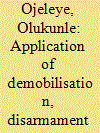

|
|
|
|
|
| Publication |
2011.
|
| Summary/Abstract |
The oil- and gas-rich Niger Delta region, plagued by violence and dominated by armed militant gangs, typifies the new face of conflict which second generation demobilisation, disarmament and reintegration (DDR) approaches are meant to address at the sub-national level. Fundamental to the emergence of militant gangs and the militarisation of civil society in Nigeria is the federal system of government and its attendant political, social and economic imbalances. This article advances the argument that the implementation of a detailed DDR programme that addresses the governance, ethnic politics, resource control, revenue distribution and national integration issues at the root of the tensions in the troubled oil- and gas-rich region will yield a greater peace dividend for all stakeholders in contrast to the current amnesty programme of the Nigerian government. This programme has been fraught with setbacks and mistrust from its client group (the militants). In so doing, DDR at the sub-national level in the Niger Delta would serve as a tool to achieve peace and long-term stability in the nation not only by removing the tools of violence - weapons and ammunition - from the militants and the civilian population but also by removing the sources of violence as reflected in socio-economic and political inequality within the Nigerian state.
|
|
|
|
|
|
|
|
|
|
|
|
|
|
|
|
| 2 |
ID:
190150
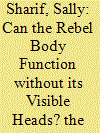

|
|
|
|
|
| Summary/Abstract |
Mid-level commanders are commonly considered the visible heads of the rebel body: as leaders of combat operations, they are often targeted in counterterrorism or counterinsurgency operations. While their role during conflict has been theorized extensively, only recent scholarship has focused on mid-level commanders in post-conflict transitions. Specifically, it is not clear how mid-level commanders function within ex-combatant groups to create divergent peacebuilding results. This paper argues that transitions from conflict involve fraying of wartime bonds and rebel command-and-control structures, which is counterproductive to peace when rebels demobilize collectively. In peacetime and in the absence of wartime command, social groups formed through military logic struggle to redefine individual roles. Mid-level commanders, responsible for shaping intergroup bonds during conflict, are essential for allocating ex-combatant roles and redefining rebel-civilian relations. Against the common practice of breaking rebel wartime command-and-control structure during demobilization, this paper argues that ex-combatant groups can demobilize and reintegrate more successfully if they maintain their wartime cohesion and are provided the necessary tools for building sustainable livelihoods. To support the argument, the paper provides original qualitative and quantitative evidence from the Disarmament, Demobilization, and Reintegration (DDR) programme with the Revolutionary Armed Forces of Colombia (FARC).
|
|
|
|
|
|
|
|
|
|
|
|
|
|
|
|
| 3 |
ID:
143336
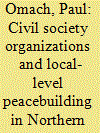

|
|
|
|
|
| Summary/Abstract |
This paper examines the contribution of civil society, notably religious and faith-based groups, traditional institutions, non-governmental organizations (NGOs), human rights groups, and community-based self-help groups, in promoting local-level peacebuilding in northern Uganda. Civil society groups in northern Uganda provided alternative narratives of the conflict, exposed brutalities against civilians, and ideas of peacebuilding. They lobbied, facilitated negotiations, engaged in building cultures of peace, promoted reconciliation, sustained livelihoods at the local level, and influenced outside peacebuilding interventions. However, the national context constrained their activities. This article is based on research and consultancy materials, personal observation, official and unofficial documents from the government, international organizations, intergovernmental agencies, and NGOs, newspaper reports, and scholarly publications.
|
|
|
|
|
|
|
|
|
|
|
|
|
|
|
|
| 4 |
ID:
163700
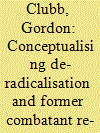

|
|
|
|
|
| Summary/Abstract |
Nigeria has recently joined the many states which have established de-radicalisation programmes. The article engages with debates on how the success of de-radicalisation can be ascertained given the substantial flaws of using individual-oriented recidivism rates as a measure. Many studies on de-radicalisation emphasise the need to consider the programme’s context to facilitate success, yet ‘context’ has been under-conceptualised and approached statically. The paper provides greater agency to ‘the context’ in distinguishing between the type of milieus former combatants are re-integrated into and how these emergent social relations shape the scope of de-radicalisation programmes, beyond the traditional over-emphasis on programme participant outcomes as measures of success. The Nigerian de-radicalisation programme has a broader function insofar as it provides former combatants with ‘scripts’ of disengagement and function as a brand, signalling to communities that former combatants have repented and are ‘better citizens, imbued with genuine nationalism’ that resonate with local communities.
|
|
|
|
|
|
|
|
|
|
|
|
|
|
|
|
| 5 |
ID:
127070
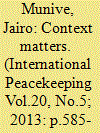

|
|
|
|
|
| Publication |
2013.
|
| Summary/Abstract |
The disarmament, demobilization and reintegration (DDR) programme as implemented in South Sudan provides a perfect entry point to study the interaction between an international intervention and local contexts. The article describes and analyses the DDR programme in South Sudan as a set of practices that are at the core of international peacekeeping and yet are highly challenged by the specificities of local contexts. Consequently, programme results are far from what the international organizations involved expected from the outset, and the case is a vivid example of a lack of context-based approaches to peacebuilding. The article is based on fieldwork conducted among practitioners, project implementers and ex-combatants in South Sudan in 2012.
|
|
|
|
|
|
|
|
|
|
|
|
|
|
|
|
| 6 |
ID:
166614
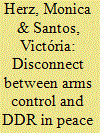

|
|
|
|
|
| Summary/Abstract |
The article discusses the disconnect between arms control and disarmament practices vis-à-vis peacebuilding practices. It critically analyzes Disarmament, Demobilization, and Reintegration (DDR) practices focusing on their absence of dialogue with international arms control and disarmament (ACD) practices. It proposes that a conversation between experts involved in these distinct practices could promote a political discussion on the place of weapons held by state and non-state actors in times of peace. The argument is illustrated through an analysis of the treatment of rules on weapons in the Colombian peace process (2012–present) with the Revolutionary Armed Forces of Colombia (FARC). The article concludes that the disconnect between the arms control and disarmament and the peacebuilding associations, as seen in the context of DDR practices, reinstates the rule on the monopoly of violence by the state, preventing a broader discussion of the role of weapons and violence in the building of political communities.
|
|
|
|
|
|
|
|
|
|
|
|
|
|
|
|
| 7 |
ID:
157509
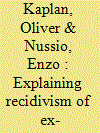

|
|
|
|
|
| Summary/Abstract |
What determines the recidivism of ex-combatants from armed conflicts? In postconflict settings around the world, there has been growing interest in reintegration programs to prevent ex-combatants from returning to illegal activities or to armed groups, yet little is known about who decides to “go bad.” We evaluate explanations for recidivism related to combatant experiences and common criminal motives by combining data from a representative survey of ex-combatants of various armed groups in Colombia with police records of observed behaviors that indicate which among the respondents returned to belligerent or illegal activities. Consistent with a theory of recidivism being shaped by driving and restraining factors, the results suggest that factors such as antisocial personality traits, weak family ties, lack of educational attainment, and the presence of criminal groups are most highly correlated with various kinds of recidivism and hold implications for programs and policies to successfully reintegrate ex-combatants into society.
|
|
|
|
|
|
|
|
|
|
|
|
|
|
|
|
| 8 |
ID:
186071
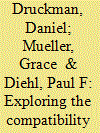

|
|
|
|
|
| Summary/Abstract |
In their 2018 article, Diehl and Druckman address several hurdles that may hinder the effectiveness of multiple mission peace operations. One of these hurdles is the extent to which two or more missions are compatible. Based on the idea that similar missions have positively reinforcing effects, we propose alternative indicators of the compatibility concept in the context of nine types of UN missions conducted within the same peace operation. We code all missions in each of 70 UN peace operations (1948–2016) on twelve characteristics, such as whether the mission could be considered impartial or biased, whether it allows for an easy or hard exit, and coordination with IOs or the host government. A multidimensional scaling analysis is performed to evaluate the proximity of these missions: missions closer in proximity are regarded as being more compatible than those farther away. The proximity scores are used to develop the three compatibility indicators based on different theoretical logics. We then apply these indicators in some preliminary statistical analyses and also compare two peace operations with different compatibility characteristics to illustrate on-the-ground relevance of the indicators. Methodological issues concerning validity, next steps in the research, and policy implications are discussed.
|
|
|
|
|
|
|
|
|
|
|
|
|
|
|
|
| 9 |
ID:
124443
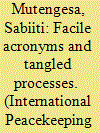

|
|
|
|
|
| Publication |
2013.
|
| Summary/Abstract |
Uganda's mass discharge of serving military personnel in the 1990s is touted as one of the most successful cases of donor-supported Disarmament, Demobilization and Reintegration (DDR). However, a closer look at that process reveals a much more complex and less dogmatic approach to managing armed factions than the linearly conceived model often encountered in the 'peacebuilding' literature. Contrary to common assumptions about that country's conflict management, particularly after the ascendance in 1986 of the Museveni government, the newly installed regime deliberately eschewed the policy of 'demobilization' and, in the process, made disarmament unnecessary, primarily by resisting donor pressure to subordinate long-haul pacification to short-term fiscal considerations. Using Uganda as a case study and DDR as a reference point, the article calls for a less perfunctory approach to the interpretation and management of the multifaceted processes of political development in the conflict-plagued pre-industrial countries of the Third World.
|
|
|
|
|
|
|
|
|
|
|
|
|
|
|
|
| 10 |
ID:
138407
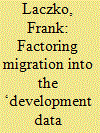

|
|
|
|
|
| Summary/Abstract |
Migration stories appear in the news around the world nearly every day. Migration is one of the most hotly debated policy issues and has grown in importance on the global agenda of the United Nations (UN). But how much do we really know about migration and the impact of migration policies and programs? Do we have the data to make a strong case for the inclusion of migration in the post-2015 development agenda? This article takes a hard look at the migration evidence base and outlines a set of recommendations to achieve a “migration data revolution” over the next decade. The article is written from a global perspective, and discusses data on both regular and irregular migration. It also considers how data are shared and used by policymakers, and why there is so little data on the impact of migration programs.
|
|
|
|
|
|
|
|
|
|
|
|
|
|
|
|
| 11 |
ID:
171800
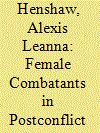

|
|
|
|
|
| Summary/Abstract |
Research on contemporary internal armed conflicts has consistently shown that women are active in most armed insurgencies, in groups with varied ideologies, and in every region of the world. However, scholarship from feminist security studies shows that, not only are women still generally underrepresented in peace processes, but women affiliated with rebel groups in particular are more likely to be excluded from disarmament, demobilization, and reintegration (DDR) efforts. Closing this gap is a necessary next step for improving the security of women. This article draws on feminist theory and feminist security studies literature to highlight four factors that contribute to the exclusion of insurgent women from DDR efforts: attributions of agency, gendered hierarchy within groups, the tendency to collapse complex intersectionalities, and the pressure for patriarchal reordering after conflict. Drawing on selected cases, I illustrate each of these factors at work and discuss the implications for female ex-combatants, policy-makers, and scholars.
|
|
|
|
|
|
|
|
|
|
|
|
|
|
|
|
| 12 |
ID:
105403
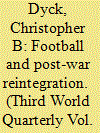

|
|
|
|
|
| Publication |
2011.
|
| Summary/Abstract |
Growing enthusiasm for 'Sport for development and peace' (sdp) projects around the world has created a much greater interest among critical scholars seeking to interrogate potential gains, extant limitations and challenges of using sport to advance 'development' and 'peace' in Africa. Despite this interest, the role of sport in post-conflict peace building remains poorly understood. Since peace building, as a field of study, lends itself to practical approaches that seek to address underlying sources of violent conflict, it is surprising that it has neglected to take an interest in sport, especially its grassroots models. In Africa, football (soccer) in particular has a strong appeal because of its popularity and ability to mobilise individuals and communities. Through a case study on Sierra Leone, this paper focuses on sports in a particularly prominent post-civil war UN intervention-the disarmament, demobilisation and reintegration (ddr) process-to determine how ex-youth combatants, camp administrators and caregivers perceive the role and significance of sporting activities in interim care centres (iccs) or ddr camps. It argues that sporting experiences in ddr processes are fruitful microcosms for understanding nuanced forms of violence and healing among youth combatants during their reintegration process.
|
|
|
|
|
|
|
|
|
|
|
|
|
|
|
|
| 13 |
ID:
122223
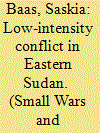

|
|
|
|
|
| Publication |
2013.
|
| Summary/Abstract |
This article discusses the development of a low-intensity conflict in Sudan's eastern region between 1994 and 2006. Drawing on data collected in the region in 2009, recruitment processes within three different insurgent groups are analysed and compared, paying attention to the impact of these processes on insurgents' organisational development and military capacity. The peace process in Eastern Sudan is further discussed, focusing specifically on the disarmament, demobilisation, and reintegration (DDR) programmes for former insurgents. The article finally discusses current developments and draws conclusions regarding the risk of renewed rebellion in Eastern Sudan.
|
|
|
|
|
|
|
|
|
|
|
|
|
|
|
|
| 14 |
ID:
167411
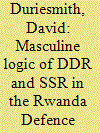

|
|
|
|
|
| Summary/Abstract |
Since the 1994 genocide and civil war, the Rwandan government has implemented an externally funded disarmament, demobilization and reintegration/security sector reform (DDR/SSR) programme culminating in the consolidation of armed groups into a new, professionalized Rwanda Defence Force. Feminists argue that DDR/SSR initiatives that exclude combatant women and girls or ignore gendered security needs fail to transform the political conditions that led to conflict. Less attention has been paid to how gendered relations of power play out through gender-sensitive DDR and SSR initiatives that seek to integrate women and transform hyper-masculine militarized masculinities. This article investigates how Rwanda’s DDR/SSR programme is governed by an oppressive masculine logic. Drawing on critical studies on men and masculinities and feminist work on peacebuilding, myths and the politics of belonging, it argues that Rwanda’s locally owned DDR/SSR programme places the military and militarization at the centre of the country’s nation-building programme. Through various ‘boundary-construction’ practices, the Rwandan government attempts to stabilize the post-1994 gender order and entrench the hegemony of a new militarized masculinity in Rwandan society. The case study draws on field research conducted in 2014 and 2015 and a discourse analysis of historical accounts, policy documents and training materials of the Rwanda Defence Force.
|
|
|
|
|
|
|
|
|
|
|
|
|
|
|
|
| 15 |
ID:
154376
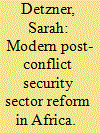

|
|
|
|
|
| Summary/Abstract |
This piece examines recurring patterns in the ‘where’ and ‘how’ of security sector reform (SSR) implementation failures in post-conflict African SSR programmes featuring substantial external involvement that have been undertaken since the mid-1990s. It finds, briefly that in these efforts, gaps in SSR implementation have tended to occur at the same points in the SSR process repeatedly. The most common issues include failures to correctly assess the post-conflict security environment, failures to ensure local ownership of reform efforts, failures to devote sufficient resources and attention to disarmament, demobilisation and reintegration (DDR, a process with close ties to SSR and force integration), failures by donors to coordinate goals and resources, and failures to include critical parts of both the de jure and de facto security sector in reforms. Post-conflict African success stories also share common characteristics, most notably a deep and wide level of societal involvement at most stages of the SSR process. These patterns, analysed as a necessary first step to discovering the ‘why’ of implementation failures in such cases, collectively suggest a focus on the early mobilisation of domestic political demand for SSR, rather than on varying methods of applying external pressure, as a fruitful avenue for future research.
|
|
|
|
|
|
|
|
|
|
|
|
|
|
|
|
| 16 |
ID:
160877
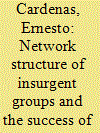

|
|
|
|
|
| Summary/Abstract |
We argue that organizational structure of insurgent organizations influences the prospects for success in a disarmament, demobilization, and reintegration process (DDR). In essence, we argue that more cohesive, tighter networks have higher levels of supervision and control on its military units and increase the probability of successful DDR processes. In order to evaluate our hypotheses, we use the theory of networks to map and characterize the network structure of the United Self-Defense Forces of Colombia (AUC) and the Revolutionary Armed Forces of Colombia (FARC). Our results suggest that armed military units grouped in smaller and more isolated components on the network remilitarize with higher probability with respect to other units on the network. Also, we find that military units with high degree of centrality on the network play an important role for the risk of conflict recurrence and success in a DDR process.
|
|
|
|
|
|
|
|
|
|
|
|
|
|
|
|
| 17 |
ID:
186844
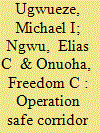

|
|
|
|
|
| Summary/Abstract |
The devastation of lives, livelihood and property in Nigeria caused by over a decade of insurgency by the Boko Haram terrorists is a subject of security, policy, humanitarian and academic concern. Several counter-measures have been adopted by both state and non-state actors to combat the insurgency with limited successes recorded. Consequently, studies have examined several efforts taken by the Nigerian government toward ending the Boko Haram insurgency, including the challenges confronting such efforts. However, Nigeria’s de-radicalization, rehabilitation and reintegration programme for ex-Boko Haram fighters, known as Operation Safe Corridor, has received marginal attention in literature. The Operation Safe Corridor programme which was established in September 2015 is aimed at de-radicalizing, rehabilitating and reintegrating repentant Boko Haram insurgents into society. Using a field survey method involving key informant interviews and focus group discussions as well as documentary reports, this article examines the progress and pitfalls of the Operation Safe Corridor programme. It argues that the failure to mainstream the concerns of local communities both in policy and programming of Operation Safe Corridor severely undermines the prospect of successful and effective reintegration of ex-Boko Haram fighters. The article concludes that if this gap is not addressed, the programme will succeed in terms of the number of ex-combatants graduating from it but will fail in terms of reintegrating the graduating ex-combatants into society. This poses significant risks to both Boko Haram defectors and society at large.
|
|
|
|
|
|
|
|
|
|
|
|
|
|
|
|
| 18 |
ID:
175825


|
|
|
|
|
| Summary/Abstract |
Development practitioners and scholars have touted security sector reform (SSR) in Sierra Leone as a model for intervention. Twenty years after such reforms began, the West African country presents one with the opportunity to study the medium-term impact of SSR. This article argues that specialists should consider this SSR along five dimensions: security institution building, military reform and integration, internal security reform, professionalization, and disarmament, demobilization, and reintegration. This study further explores the impact these factors have had on security performance and legitimacy in the two decades since their implementation. Finally, this work concludes with an analysis of the current state of the security sector as well as a consideration of the lessons to be learned from the Sierra Leonean experience.
|
|
|
|
|
|
|
|
|
|
|
|
|
|
|
|
| 19 |
ID:
177851


|
|
|
|
|
| Summary/Abstract |
On the basis of 12 months of field research conducted in nine cities in Côte d’Ivoire, this study explores the relationship between demobilization, disarmament and reintegration (DDR) and transitional justice. It finds that suggestions that the two should be totally isolated from one another are both extremely difficult and undesirable in a post-conflict setting where DDR and transitional justice interact frequently and could, in theory, have many positive ramifications for one another. However, contrasting propositions that far-reaching coordination should occur between DDR and transitional justice are not without difficulty. Bringing the two initiatives together is often challenging, particularly at a national level where the political will of post-war governments can be lacking and populations resistant to more comprehensive peacebuilding programmes. Instead, the article proposes, a third, more moderate approach to coordination. It suggests that a bare minimum level of cooperation should be considered a benchmark, ensuring that DDR and transitional justice practitioners are always aware of what is occurring in the other domain. Beyond this, greater cooperation may not be possible, but where it is, it is most likely to be achieved successfully at a local level, between social reintegration and personal reconciliation
|
|
|
|
|
|
|
|
|
|
|
|
|
|
|
|
| 20 |
ID:
181161


|
|
|
|
|
| Summary/Abstract |
Policymakers and peacebuilding research often focus on rebel groups when studying demobilization and integration processes, but post-war governments must also manage the non-state militias that helped them gain or maintain power. Why do some post-war governments disintegrate their militia allies, while others integrate them into the military? We argue that when a salient ethnic difference exists between the (new) ruling elite and an allied militia, a process of mutual uncertainty in the post-war period will incentivize governments to disintegrate the group. However, governments will be most likely to integrate their militias when the military has sufficient coercive capabilities but few organizational hindrances to re-organizing. Using new data on the post-war fates of victorious militias across all civil conflicts from 1989 to 2014, we find robust support for these claims. The results suggest that a government’s optimal militia management strategy is shaped by both social and organizational constraints during the post-war period.
|
|
|
|
|
|
|
|
|
|
|
|
|
|
|
|
|
|
|
|
|